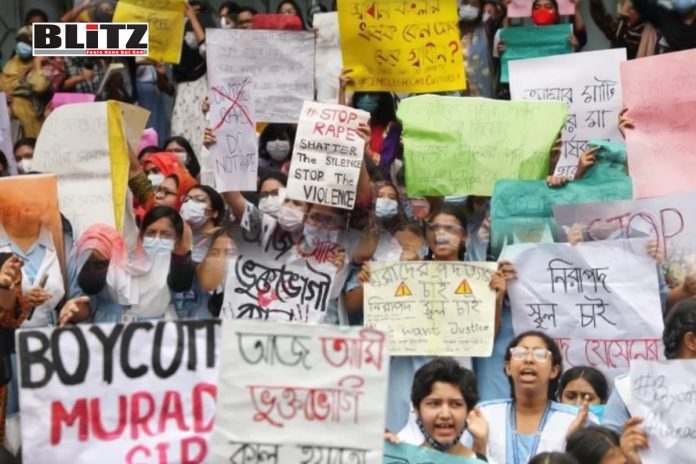The unrelenting hostility against female students within Bangladesh’s educational institutions represents a formidable obstacle to the nation’s progress in women’s empowerment. Recent incidents, including the solidarity demonstrated by students at Dhaka University’s Department of Mass Communication and Journalism, who boycotted a class to support a peer reporting sexual harassment, underscore the urgent need for comprehensive action. Tragically, stories like that of Nusrat Rafi, who faced fatal consequences for refusing to withdraw a sexual assault case, illustrate the grave repercussions of unchecked educational inequality.
Bangladesh, often hailed as a role model in female education within South Asia, boasts impressive statistics indicating increased female participation at the primary level. Endorsements from luminaries such as Nobel laureate Amartya Sen further underscore the nation’s commitment to women’s education as pivotal to social and economic progress. However, beneath these promising statistics lies a grim reality marked by persistent issues like child marriage and incidents of low-birthweight babies. Shockingly, the very institutions intended to foster empowerment have become breeding grounds for hostility, perpetuating traditional gender biases and violence. From outdated textbooks to rampant sexual harassment, negative experiences within educational settings hinder cognitive development, erode self-esteem, and impede future career prospects, contributing to a decline in girls’ enrollment at the college level.
Discrimination within educational institutions is deeply entrenched, with studies revealing alarming rates of violence and harassment experienced by female students across various educational levels. Moreover, students face prejudice based on attire, ethnicity, rural background, and prior schooling, exacerbating their vulnerability. These negative experiences not only deter academic pursuits but also contribute to mental health issues and foster a culture of silence surrounding harassment.
The consequences of discrimination within educational settings are profound, leading to academic underachievement, alterations in career paths, and even brain drain. For many first-generation female college students, the dream of pursuing higher education is overshadowed by the hostile environment they encounter upon arrival. Confined by fear and societal pressures, victims of harassment often suffer in silence, perpetuating a cycle of violence and discrimination.
Addressing the multifaceted nature of inequality within educational institutions demands a collaborative and comprehensive approach involving all stakeholders. While policies exist, their effective implementation remains a challenge, particularly in cases where perpetrators and adjudicators are affiliated with ruling political elites. Initiatives such as mandatory sexual misconduct prevention training for students and faculty members can help raise awareness and promote a safer learning environment, drawing inspiration from successful programs implemented in universities abroad.
Moreover, efforts to combat discrimination and violence against female students must extend beyond campus boundaries to ensure justice and security for women in all spheres of society. As the world approaches International Women’s Day, it is imperative to redouble efforts to address educational inequalities and foster a more equitable future for all. Only through concerted action can Bangladesh uphold its reputation as a beacon of progress in women’s empowerment and truly empower its female students to thrive in a supportive and inclusive educational environment.
However, achieving lasting change requires a nuanced understanding of the systemic issues at play. Rooted in societal norms and power dynamics, addressing hostility against female students necessitates challenging deeply ingrained attitudes and behaviors. Educational institutions must prioritize creating safe spaces where students feel empowered to report harassment without fear of reprisal. Additionally, efforts to promote gender sensitivity and inclusivity must be integrated into curricula and institutional policies to foster a culture of respect and equality from an early age.
Furthermore, engaging with communities and families is essential in shifting cultural norms and perceptions surrounding gender roles and education. Empowering parents, particularly in rural areas where traditional beliefs may prevail, to support their daughters’ educational aspirations is crucial in breaking the cycle of discrimination and early marriage. Providing access to education and awareness programs that highlight the benefits of educating girls can help challenge entrenched beliefs and promote gender equality at the grassroots level.
In tandem with these efforts, government bodies and civil society organizations must work collaboratively to enforce existing laws and policies aimed at protecting female students’ rights. Establishing robust mechanisms for reporting and addressing cases of harassment, including impartial investigation processes and legal support for victims, is essential in holding perpetrators accountable and ensuring justice is served.
Moreover, investing in the professional development of teachers and educators to recognize and address gender-based violence and discrimination is paramount. Equipping them with the tools and resources to create inclusive learning environments where all students feel valued and respected is crucial in fostering a culture of gender equality within educational institutions.
Additionally, leveraging technology and digital platforms can amplify efforts to raise awareness and educate students, parents, and communities about the importance of gender equality and women’s empowerment. Utilizing social media campaigns, online resources, and interactive workshops can help reach a wider audience and spark meaningful conversations about challenging societal norms and fostering a more inclusive society.
In conclusion, the battle against hostility targeting female students in Bangladesh’s educational institutions demands a comprehensive strategy addressing the underlying drivers of discrimination and violence, alongside the promotion of gender equality and empowerment of women. Through concerted efforts involving government entities, educational establishments, communities, and families, and employing a blend of policy measures, advocacy endeavors, and educational programs, Bangladesh can forge a more equitable and nurturing atmosphere. This holistic approach aims to cultivate an inclusive environment conducive to the flourishing of all students, irrespective of gender, enabling them to realize their aspirations and contribute meaningfully to society.




